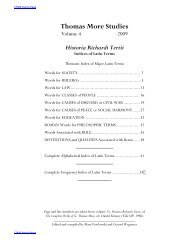Study Guides for Utopia - The Center for Thomas More Studies
Study Guides for Utopia - The Center for Thomas More Studies
Study Guides for Utopia - The Center for Thomas More Studies
You also want an ePaper? Increase the reach of your titles
YUMPU automatically turns print PDFs into web optimized ePapers that Google loves.
Dates and Names in <strong>Utopia</strong> (Cambridge UP, Revised edition)<br />
Dates<br />
ca.1497 – Raphael meets and speaks with Archbishop Morton (p.16n20 of 2 nd Cambridge UP edition.)<br />
1501, 1503 – Vespucci’s 1 st and 2 nd (and only**) voyages to the New World; Raphael says he was on the<br />
last 3 of Vespucci’s 4 voyages (p. 10)<br />
ca.1504-1509 – Raphael then spends “more than five years” in <strong>Utopia</strong> (p. 39)<br />
ca.1504 – Four Voyages of Amerigo Vespucci (a <strong>for</strong>gery**) published in Vienna & becomes best seller<br />
1514 – first printing of Hesychius’ Greek dictionary, which Raphael says he took with him in 1503<br />
1515 – <strong>More</strong>’s trip to Antwerp where he meets Giles and Raphael and then writes most of <strong>Utopia</strong><br />
1519-22 – Magellan is first to circumnavigate the globe, unless Raphael’s claim is correct<br />
Names<br />
<strong>Utopia</strong> – “noplace” in Greek (Eutopia would have been “happy place.”)<br />
Raphael – “God’s healer” in Hebrew<br />
Hythlodaeus – “distributor or peddler of nonsense” in Greek<br />
Morus – “fool” in Greek<br />
Names of rulers be<strong>for</strong>e Utopus conquered<br />
syphogrant – “old men of the sty”*; compare with Plato’s “sycophant” at 340d et al in Republic<br />
tranibor – “plain glutton”*<br />
Barzanes (<strong>for</strong>mer name of the ruler or princeps) – “leader of cattle,”* barion (“cattle”) + zanides (“one<br />
who leads”)<br />
Name of ruler after Utopus conquered<br />
Phylarch – “fond of power”; “head of a tribe” (CW 4, p. 114/7)<br />
Protophylarch – proto means “first,” so the ruler “most fond of power”<br />
Ademos (present name of the princeps, instead of “Barzanes”) - ademon: not being native, adema:<br />
“dogma, without <strong>for</strong>m or idea”;* a demos: “without people” (CW 4, 133/8-9)<br />
Names associated with <strong>Utopia</strong>n religion<br />
Abraxa - <strong>for</strong>mer name of island; highest of 365 spheres of gnostic universe<br />
Mithra - name of Persian gnostic god and of <strong>Utopia</strong>'s god<br />
Buthrescas - Bythus (a gnostic god) + ureskos (“superstitious”) or ureskeia (“religious cult”) = superstitious<br />
cult of Bythus<br />
Other names<br />
Amaurot (name of a <strong>Utopia</strong>n city) – “[made]* dark”<br />
Anyder (name of a <strong>Utopia</strong>n river) – “without water”<br />
Anemolian [ambassadors] – “windy”<br />
Nephelogetes – “People born from the clouds” [allies of <strong>Utopia</strong>ns]<br />
Alaopolitans – “people without a country” [reduced to slavery by Nephelogetes]<br />
Zapoletes – “busy sellers” [mercenaries hired by <strong>Utopia</strong>ns]<br />
quaestor – Collector of Revenues (p. 92)<br />
Polylerites – “people of much nonsense (or lying)”* [example used with Cardinal Morton]<br />
Achorians – “people without a country” [later example used by Raphael in book 1]<br />
Title in Latin: De Optimo Reipublicae / Statu deque / nova insula <strong>Utopia</strong> libellus vere aureus, / nec minus<br />
salutaris quam festivus, / clarissimi disertissimique viri Thomae Mori / inclytae civitatis Londinensis civis / &<br />
Vicecomitis.<br />
*See Ward Allen's "Speculations on St. <strong>Thomas</strong> <strong>More</strong>'s Use of Hesychius" in Philological Quarterly 46.2<br />
(April 1967): 156-166.<br />
**See F.J. Pohl’s Amerigo Vespucci (1945); Peter Ackroyd’s <strong>Thomas</strong> <strong>More</strong>, p. 170 (1998); Dominic Baker-Smith’s <strong>More</strong>’s<br />
<strong>Utopia</strong>, pp. 91-92 (2000).<br />
www.thomasmorestudies.org, 5/05<br />
2











